- Home
- Alex Berenson
The Ghost War
The Ghost War Read online
Table of Contents
Title Page
Copyright Page
Dedication
PART 1
Chapter 1
Chapter 2
Chapter 3
Chapter 4
Chapter 5
Chapter 6
PART 2
Chapter 7
Chapter 8
Chapter 9
Chapter 10
Chapter 11
Chapter 12
Chapter 13
Chapter 14
Chapter 15
Chapter 16
Chapter 17
PART 3
Chapter 18
Chapter 19
Chapter 20
Chapter 21
Chapter 22
Chapter 23
Chapter 24
Chapter 25
Chapter 26
Chapter 27
PART 4
Chapter 28
Chapter 29
Chapter 30
Chapter 31
Chapter 32
Chapter 33
Chapter 34
Chapter 35
Chapter 36
Chapter 37
Chapter 38
EPILOGUE
Acknowledgements
Teaser chapter
“A very sophisticated vision... Geopolitically savvy.”—The New York Times
“A fast-paced story of international intrigue and espionage... Wells is a fine character who will likely propel Berenson’s thrillers to success for some time to come.”—Chicago Sun-Times
“Mesmerizing ... an extraordinary achievement.”
—The (Raleigh,NC) News & Observer
“Terrific and relentless suspense and action.”
—Kirkus Reviews
“Berenson marshals turncoats, the Taliban, and testosterone to produce a tautly paced, credible, and gripping scenario guaranteed to buttress Berenson’s niche as one of the stars in the suspense firmament.”
—Library Journal
“Stellar . . . Wells is a fascinating, tortured soul, and his attempts to live a normal life create a gripping narrative. The authenticity Berenson brings to his ripped-from-the-headlines stories makes them seem as vividly real and scary as nonfiction or the nightly news.”—Booklist
“The author’s plausible scenario distinguishes this from most spy thrillers.”—Publishers Weekly
Praise for
THE FAITHFUL SPY
Winner of the Edgar® Award
“A well-crafted page-turner that addresses the most important issue of our time. It will keep you reading well into the night.”—Vince Flynn
“One of the best espionage books of all time.”
—William Stevenson, author of A Man Called Intrepid
“An intriguing thriller studded with alarming possibilities.”—New York Daily News
“The best spy thriller in a long, long while.”
—The Kansas City Star
“Berenson offers a very American story—a sort of terrorist High Noon ... Exciting.”—The New York Times
“A hold-your-breath thriller... a grabber.”
—St. Louis Post-Dispatch
“Mounting suspense, a believable scenario, and a final twist add up to a compelling tale of frightening possibilities. It’s not for the squeamish, though: the torture sequences and bombing descriptions are graphic and chillingly real.”—Publishers Weekly
“Berenson has done a sharp job of pulling together possible what-ifs and combining them with a journalist’s knowledge of how government and the military operate.”—Rocky Mountain News
“[An] unsettling first novel... Dirty bombs and biological contamination riddle this novel with paranoia and the frightening realization that an attack on the United States, as it’s laid out in The FaithfulSpy, appears highly plausible, even inevitable.”—USA Today
“A thriller worthy of Le Carré ... The payoff is tremendous.” —Kirkus Reviews (starred review)
“A well-informed, often chilling look at how al Qaeda might launch a major new attack in the United States—and how one intrepid undercover agent might do his darnedest to foil it... A timely reminder of the extremely precarious way we live now.”
—The WashingtonPost
“Berenson is clearly a go-getter... [His] debut is gritty and fast-moving.”—The Observer (UK)
“This is New York Times reporter Alex Berenson’s first novel, but you wouldn’t know it by the writing or the plot, both of which are razor sharp . . . Crisp writing, understatement, and an aversion to the sort of caricatures that have sunk other books without a trace make this story sing... This high-voltage thriller has major motion picture written all over it.”
—Minneapolis Star Tribune
“Berenson is a crackerjack researcher and possesses a seemingly native ability to write entertaining fiction. He quickly sets his story in motion, creating engrossing scenes.” —Chicago Tribune
“As a reporter for the New York Times, Alex Berenson has spent time in Iraq. He draws on his experience in writing this taut and quite chilling thriller... Berenson has written a solid debut novel notable for its relevancy and great sense of reality.”
—The TampaTribune
“This is one of the most unusual and engrossing spy-action books I have read in many decades of perusing such books, starting with the original James Bond novels . . . All this is written in the most realistic style, giving us a very good picture of life on that side of this ongoing war ... This is a good one. It is action packed, but it is also a sophisticated view of the new and unusual kind of warfare that America and the West face.”
—Lincoln JournalStar
“Alex Berenson [has] concentrated on building suspense, maintaining thrills, and plotting a frighten- ingly plausible scenario... a worthwhile first effort... The FaithfulSpybrims with knowledge, especially about the frightening tactics used in the name of war.”
—The Baltimore Sun
“A complex idea and a multilayered story... Berenson takes readers across the world, unveiling al Qaeda’s brilliant and evil plot slowly. For sheer drama, no one can fault Berenson’s plot. His daring leaps in many directions almost always pay off. Scenes of torture and attacks are so clearly written, readers will be able to feel the pain.”—Detroit Free Press
“In his debut thriller, investigative reporter Berenson has come up with an intriguing premise... Well written.” —Library Journal
“A fast-moving, timely thriller with interesting characters and believable events—all ably narrated by Dean, who appears to know just how to tell the tale. His deep, rich tones set just the right mood for CIA agent Wells.” —KLIATT
“Berenson paints a realistic picture of a modern-day terrorist attack inside America. His theme is worthy of a John le Carré novel... this is a page-turner of a book, putting gripping drama into an all-too-believable cautionary tale.”
—The London (Ontario) Free Press
ALSO BY ALEX BERENSON
The Faithful Spy
The Number (nonfiction)
THE BERKLEY PUBLISHING GROUP
Published by the Penguin Group
Penguin Group (USA) Inc.
375 Hudson Street, New York, New York 10014, USA
Penguin Group (Canada), 90 Eglinton Avenue East, Suite 700, Toronto, Ontario M4P 2Y3, Canada
(a division of Pearson Penguin Canada Inc.)
Penguin Books Ltd., 80 Strand, London WC2R ORL, England
Penguin Group Ireland, 25 St. Stephen’s Green, Dublin 2, Ireland (a division of Penguin Books Ltd.)
Penguin Group (Australia), 250 Camberwell Road, Camberwell, Victoria 3124, Australia
(a division of Pearson Australia Group Pty. Ltd.)
P
enguin Books India Pvt. Ltd., 11 Community Centre, Panchsheel Park, New Delhi—110 017, India
Penguin Group (NZ), 67 Apollo Drive, Rosedale, North Shore 0632, New Zealand
(a division of Pearson New Zealand Ltd.)
Penguin Books (South Africa) (Pty.) Ltd., 24 Sturdee Avenue, Rosebank, Johannesburg 2196,
South Africa
Penguin Books Ltd., Registered Offices: 80 Strand, London WC2R ORL, England
This is a work of fiction. Names, characters, places, and incidents either are the product of the author’s imagination or are used fictitiously, and any resemblance to actual persons, living or dead, business establishments, events, or locales is entirely coincidental. The publisher does not have any control over and does not assume any responsibility for author or third-party websites or their content.
THE GHOST WAR
A Jove Book / published by arrangement with the author
Copyright © 2008 by Alex Berenson. Excerpt from The Silent Man copyright © 2009 by Alex Berenson.
All rights reserved.
No part of this book may be reproduced, scanned, or distributed in any printed or electronic form
without permission. Please do not participate in or encourage piracy of copyrighted materials in
violation of the author’s rights. Purchase only authorized editions.
For information, address: The Berkley Publishing Group,
a division of Penguin Group (USA) Inc.,
375 Hudson Street, New York, New York 10014.
eISBN : 978-1-429-59753-1
JOVE®
Jove Books are published by The Berkley Publishing Group,
a division of Penguin Group (USA) Inc.,
375 Hudson Street, New York, New York 10014.
JOVE® is a registered trademark of Penguin Group (USA) Inc.
The “J” design is a trademark of Penguin Group (USA) Inc.
http://us.penguingroup.com
For Ellen and Harvey, my parents
Let China sleep, for when she wakes, she will shake the world.
—NAPOLEON
Be subtle. Use your spies for every kind of business.
—SUN TZU,
The Art of War
PART 1
1
INCHEON, SOUTH KOREA
TED BECK WALKED WEST DOWN THE ROTTING PIER, squinting through his wraparound sunglasses into the late-afternoon haze. He moved without haste. He’d arrived early, and the boat he’d come to meet was nowhere in sight.
At the end of the dock, trash from three countries—China and the two Koreas—bobbed in the dank water, the eastern edge of the Yellow Sea. The air was heavy with smoke from the ships that docked at Incheon every day to load up on cars and televisions for the United States. The sun had baked the fumes into a brown smog that burned Beck’s throat and made him want a cigarette.
He fished a packet of Camel Lights from his pocket and lit up. He’d tried to quit over the years. But if he was going to sign up for missions like this one, what was the point? He smoked slowly and when he was done flicked the butt away. It spun into the harbor, joining the empty beer cans and condom wrappers.
Then he heard the low rumble of a boat engine.
Incheon was an industrial port fifty miles west of Seoul and a few miles south of the Demilitarized Zone, the strip that separated North and South Korea. During the Korean War, General Douglas Mac-Arthur had landed here, cutting behind North Korean lines to stop the Communist advance.
A statue of him stood atop a hill not far from this pier. Binoculars in hand, the general looked out to the Yellow Sea, which separated China and the Korean Peninsula. This afternoon, Beck would head into those waters, on a mission smaller than MacArthur’s assault but just as dangerous.
The rumble of the distant boat grew louder. Beck pulled his wallet out of his pocket, a battered piece of cowhide that had seen him through thirty-two countries and three counterinsurgencies. He wasn’t carrying any identification or a passport, just money. About $3,000 in all. And three pictures: his wife and their two sons. He took out the pictures and kissed them.
Then he flicked his lighter to them and watched them burn, holding them as long as he could, until the flames singed his fingers and he had to let them go. Their remnants sank into the water and drifted away.
Beck carried out the same ritual before every mission, for reasons both practical and superstitious. If he was caught, the photographs would give his captors a psychological edge. More important, burning the pictures was his way of accepting the danger of the mission. When he came back, he’d put fresh copies in his wallet. Until the next time.
THE MESSAGE HAD COME IN twelve days before, to a signals-intelligence station at Camp Bonifas, on the edge of the Demilitarized Zone. The six hundred Americans and South Koreans who lived at Bonifas stayed on alert twenty-four hours a day, knowing they would be the world’s tripwire if the North Korean army came over the DMZ. As they waited, they monitored the North’s airwaves, listening for messages from American spies across the border.
To the officers at the Bonifas station, the transmission was gibberish, a twenty-two-second series of Is and 0s. But they knew it meant something, for it came in on a shortwave frequency reserved for the highest-priority messages. They forwarded it around the world to Fort Meade, Maryland, the headquarters of the National Security Agency. From Fort Meade, the message, now decoded, took a shorter trip, across the Potomac to a seventh-floor office at CIA headquarters.
There it caused Vinny Duto, the director of the CIA, to unleash a few uncoded curses of his own. For the message was short, simple—and unwelcome. The Drafter wanted out of the Democratic People’s Republic of Korea, the country-sized prison commonly called North Korea. Immediately if not sooner.
The Drafter’s real name was Sung Kwan. Dr. Sung Kwan. He was a scientist in North Korea’s nuclear program, and by far the most important asset the United States had in North Korea. “Asset” was a rather clinical way to describe Sung, who was after all a person, not a spy satellite or a well-placed bug. But the term was fitting. For Sung had told the United States exactly where the North Koreans held their nuclear weapons—information that was priceless.
Most analysts outside the CIA thought that North Korea hid its nukes in caves, hoping to keep them safe from an American airstrike. They were wrong. In fact, the nukes were kept in a warehouse in Pyongyang, North Korea’s capital. The Dear Leader, Kim Jong Il, wanted them close by, protected by the same army regiment that provided his personal security.
Now the USS Lake Champlain,a guided missile cruiser in the Sea of Japan, had a dozen Tomahawk missiles targeted on the building. If the order came, the Tomahawks could turn the warehouse into rubble in minutes. All thanks to Sung. And now he wanted an emergency exfiltration. No wonder Vinny Duto was upset.
SUNG WAS A CAREFUL SPY. He had met American agents only three times, each time in Pakistan, outside the Orwellian gaze of the North Korean secret police. But now something had gone wrong. In his message, Sung said he was concerned for his safety and believed he needed to get out of North Korea. He didn’t explain more.
At Langley, the officers on the North Korea desk struggled to make sense of Sung’s message. How did he know he was about to be taken in? Had he been interrogated? Or had he been arrested already, strung up and left to rot? In that case, the pickup request was nothing more than bait, an SOS from a man who had already drowned, meant to lure would-be rescuers into an ambush.
The CIA responded to Sung with its own shortwave broadcasts, asking him for more detail. But as the days ticked by, the listening station at Bonifas remained quiet.
Finally Duto decided that the agency had to send in a team. Without proof that the message was a trap, Langley couldn’t ignore Sung’s plea. The agency always promised its moles to respond if they asked for help. The vow was both a moral obligation and a recruiting tool. Moles needed to believe that their agency handlers shared the risks they took.
Three men were goi
ng in. Beck, the leader, was a former Navy Seal, now a senior officer in the agency’s Special Operations Group. He was accompanied by Seth Kang, a Korean-American operative who’d infiltrated North Korea before, and Choe Gu, a lieutenant in the South Korean navy. All knew the risks of this mission. But they couldn’t say no, not once they understood the stakes.
THE PHANTOM LOOKED FAST even when it wasn’t moving. The boat was matte black, narrow and long, with an arrow-shaped hull that came to a razor-sharp tip. It was a cigarette boat, the kind favored by drug runners for quick trips in calm seas. But in place of an open deck, like most cigarette boats, the Phantom had a cabin covering its cockpit, topped by a small forest of microwave dishes. Its windows were two-inch-thick bullet-resistant glass. For extra range the Phantom carried three gas tanks that held six hundred gallons in all. For extra protection its hull was coated with Kevlar. And for extra speed it had twin Mercury engines that threw out 650 horsepower apiece. At full throttle, it ran at seventy knots.

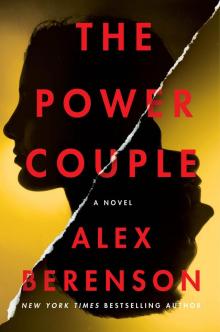 The Power Couple
The Power Couple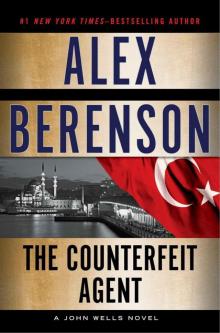 The Counterfeit Agent
The Counterfeit Agent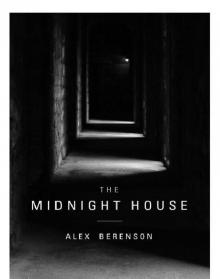 The Midnight House
The Midnight House The Prisoner
The Prisoner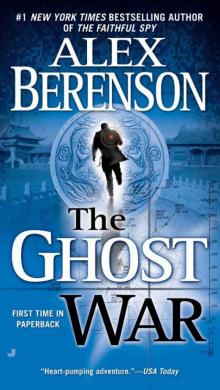 The Ghost War
The Ghost War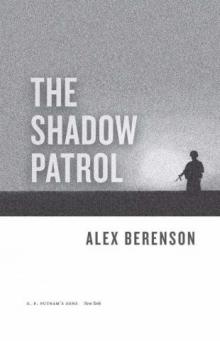 The Shadow Patrol jw-6
The Shadow Patrol jw-6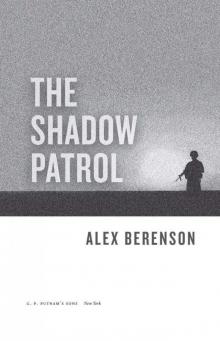 The Shadow Patrol
The Shadow Patrol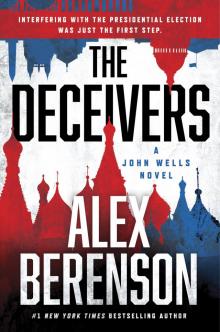 The Deceivers
The Deceivers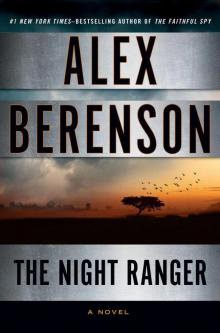 The Night Ranger jw-7
The Night Ranger jw-7 The Faithful Spy
The Faithful Spy The Prince of Beers (Kindle Single)
The Prince of Beers (Kindle Single)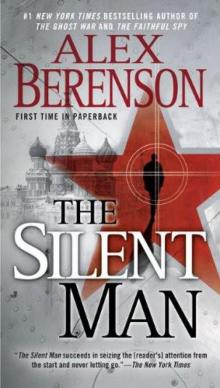 The Silent Man jw-3
The Silent Man jw-3 The Silent Man
The Silent Man The Wolves
The Wolves The Midnight House jw-4
The Midnight House jw-4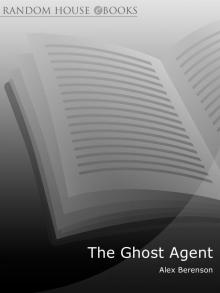 The Ghost Agent
The Ghost Agent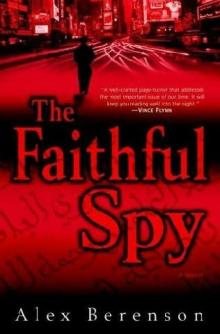 The Faithful Spy jw-1
The Faithful Spy jw-1 The Prince of Beers
The Prince of Beers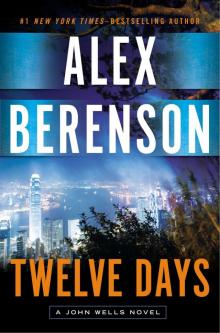 Twelve Days
Twelve Days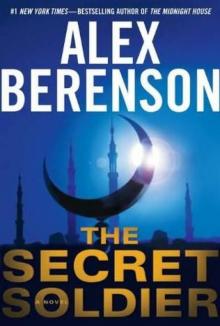 The Secret Soldier jw-5
The Secret Soldier jw-5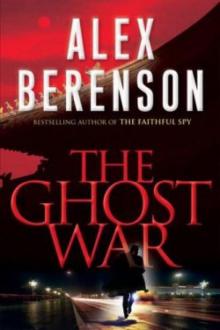 The Ghost War jw-2
The Ghost War jw-2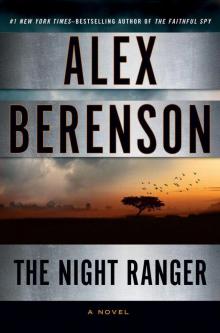 The Night Ranger
The Night Ranger